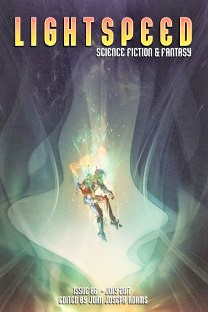“The Law of Conservation of Data” by John Grant
Reviewed by Kevin P Hallett
There are eight stories in this issue, four of which are reprints.
“The Law of Conservation of Data” by John Grant
This SF novelette takes place in the far, far future when humanity has outgrown its galaxy, and forgotten its origins. Rehan is part of a consensuality with four others, where they share their time together both in spiritual essence and physically.
The group decides to visit a black hole, the site where a long-forgotten dictator tossed a casino asteroid smearing it across the black hole’s event horizon preserving its data for anyone to see. When Rehan visits the casino’s data the ways of these ancient humans fascinate him. But they also raise some intriguing questions that Rehan will have to take extreme risks to answer?
Grant told the story in the rare second person, and it worked well. The prose was easy to read, and the story explored some interesting ideas. It was much more a story to stimulate the intellect than the heart.
“A Touch of Heart” by Alvaro Zinos-Amaro and Adam-Troy Castro
Duo Zhuo is an unlucky farmer in this short fantasy. Nothing he toils to grow is appealing, while his neighbor, Gan, enjoys a bountiful crop with little effort. Jealousy and anger consume Duo. After failing to buy Gan out, he seeks an alternative solution.
When Duo runs into Su, a master assassin, he promises to give Su all his savings for the death of his neighbor. Duo’s appeal moves Su, and he agrees to carry out the killing in two months during the local produce market fair. But Su is a master for good reason, and things turn out in unexpected ways for Duo. In the end, Duo receives a most unexpected solution.
The authors have spun an unusual story that was a true pleasure to read. Few things went as expected as the prose quickly wrapped up the reader in Duo’s character. We would all be better off if we could learn from this fantasy.
“Mix Tapes from Dead Boys” by E. Catherine Tobler
Tobler’s short SF revolves around Hadley, who is exploring a derelict spaceship that suddenly appears in close Neptune orbit. When she enters the derelict, she becomes enmeshed with scenes from the past, ghosts, and glitches that seem to erode her sanity.
Does she imagine an attack by the derelict against her home station? Has she really lost her leg? The scenes roll through her consciousness as she searches for the meaning.
A confused story with a disjointed plot that seemed to go nowhere.
“How to Find a Portal” by Debbie Urbanski
Women in dirty white vans entice young girls to pass through portals to other worlds in this short SF tale. But not the protagonist. They never invite her, though she longs to go. The invited girls return years later, transformed into semi-catatonic states. Yet, still she wants to find her own portal and leave.
Over time she grows up and tries to live a regular life, with normal aspirations. But the boredom of the typical life rekindles her desire to find her own portal. Her search drives her partner to leave.
By now, her parents are old and dying. Her mother sees portals everywhere, but the protagonist cannot pass through someone else’s portal. And so, she waits, uncertain why her portal has never shown itself.
After an interesting opening, this story slowed down. The prose had no pull to it and it became a chore to read to an end that fizzled away.
 Lightspeed #86, July 2017
Lightspeed #86, July 2017